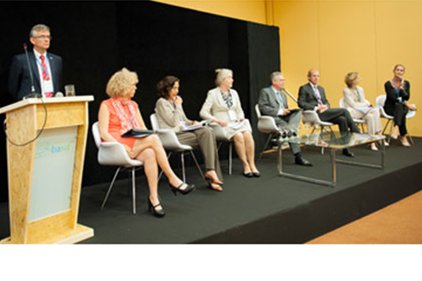
|
| Photo (left to right): Jon Hutton, Jennifer Morgan, Sabina Ratti, Ellen Williams, Ricardo Castello Branco, Allard Castelein, Manoelle Lepoute and Hege Marie Norheim. |
Gas flaring, biofuels and solar lamps came up for discussion during an oil and gas industry session at Rio+20, the United Nations Conference on Sustainable Development which concludes today.
The industry session was hosted by IPIECA, the global oil and gas industry association for environmental and social issues.
The following were identified as examples of how the industry is working to meet sustainability challenges:
- Contributing to the UN’s Sustainable Energy for All initiative by reducing gas flaring. Instead the gas is used to produce oil in a more energy efficient way and facilitate the use of renewable energy sources.
- Developing solar photovoltaic solutions to the market by providing access to solar lamps and kits to low income people, through the growth of an efficient and sustainable social business, a large scale warranty system and effective recycling solutions; all achieved by developing strong local partnerships
- Developing new models of partnership and collaboration to address the additional strain placed on the world’s water supplies caused by rising energy consumption.
- Developing biofuels to supply affordable, safe and sustainable energy to consumers, contributing to socioeconomic development and at the same time, reducing Greenhouse Gas emissions
- Partnering with leading research universities to explore the key issues that could shape future energy supply and demand.
- Deploying effective solutions to some of the challenges posed by local development needs, such as using previously flared gas to generate electricity for local markets.
One panelist challenged the industry with contributing to the transition to a lower carbon economy and building a profitable and sustainable energy system.
It was recognized that scaling up current sustainability-related efforts can only be achieved through partnerships between governments, consumers, communities, NGOs and business and industries around the world.
Speakers included:
- Renato Bertani, Chair and President (The Brazilian Petroleum, Gas, and Biofuels Institute (IBP), World Petroleum Council (WPC))
- Brian Sullivan, Executive Director (IPIECA)
- Milton Costa Filho, Chair (ARPEL)
- Jon Hutton, Director (UNEP-WCMC )
- Hege Marie Norheim, Senior Vice President, Corporate Climate (Statoil)
- Manoelle Lepoutre, Executive Vice President, Sustainable Development & Environment (Total)
- Allard Castelein, Vice President Environment (Shell)
- Ricardo Castello Branco - Director of Ethanol Ventures (Petrobras Biocombustível S.A.)
- Ellen Williams, Chief Scientist (BP)
- Sabina Ratti, Senior Vice President Sustainability (eni)
- Jennifer Morgan, Director Climate and Energy program (World Resources Institute)








